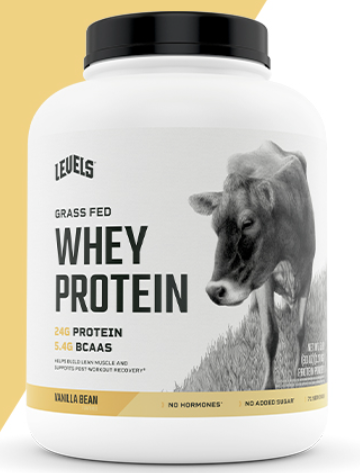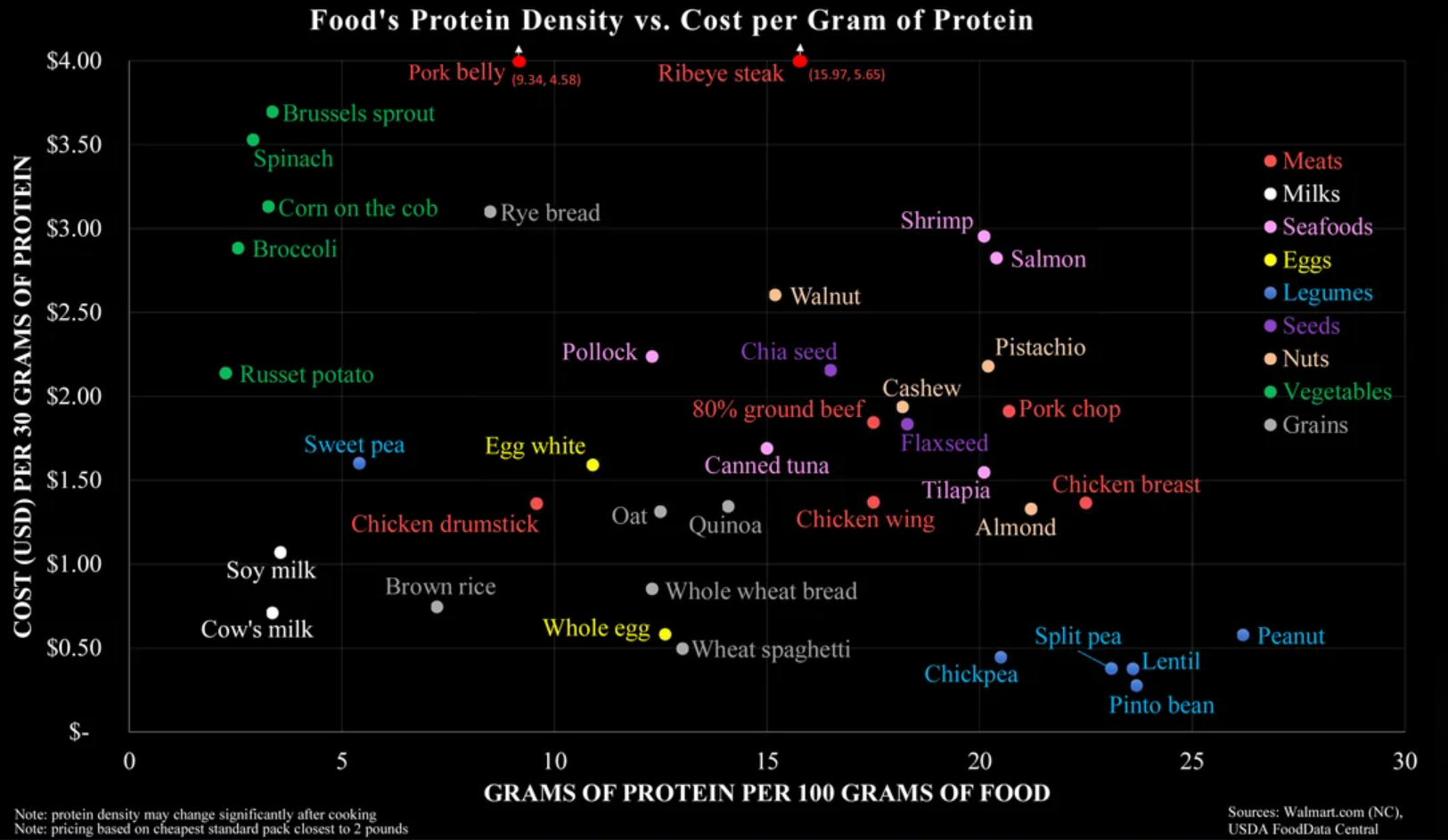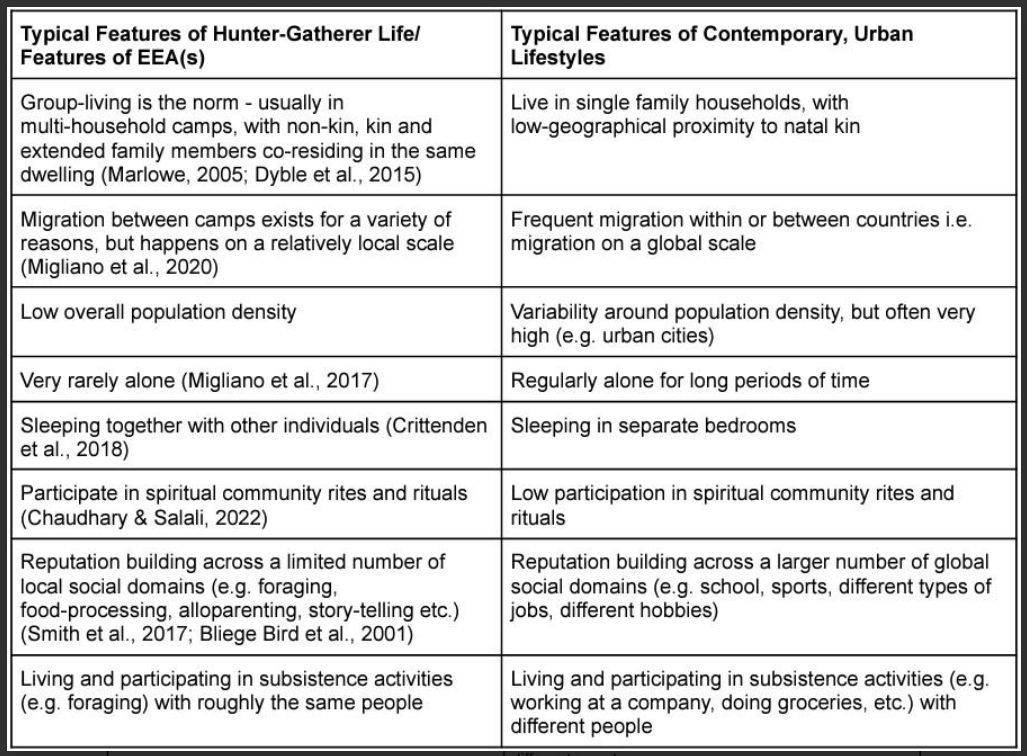March 2024
Lessons From Kids In W.V.
Hi all,
This past weekend, we reunited with 21 of my wife's college friends and their families and their 21(!) kids. It was three days of beautiful wildness on an estate surrounded by farm animals, picturesque mountainous views, and car-sick-inducing stretches of West Virginia roads.
As a less-stressed observer who was there without his kids, it was interesting to see the behavior of so many children under the age of 9 for a few days straight. While my kids get plenty of time with other kids, it's usually relegated to peers, scheduled school time, and organized sports for no more than a few hours.
So, it got me thinking.
Kids of these ages are still largely untouched by society's complexities (corruptions?) so their curious, fun, and unfiltered ways are true to our ancestral ways. Of course, this becomes diminished as we age, largely due to the development of the prefrontal cortex, but that doesn’t mean we need any of these ancestral ways of living less.
Watching these families interact, it was clear the parents behind these kids were doing something right. The way the children played together, with kindness, resilience, and infectious fun, spoke volumes about the values instilled at home.
Based on that, here are some lessons that kids can teach us adults.
They rebound quickly. Bumps, bruises, frustration they didn't get the snack or hit the piñata, having to sit in the car for hours and hours. Their ability to rebound from disappointments and discomforts demonstrates the benefits of living in the moment.
They're adaptable. New environment? New peers? New food? New sleep schedule? Maybe they don't embrace it with enthusiasm every time but they have the capacity to make the most of unfamiliar situations.
They crave movement variety. Sprinting, climbing, jumping, and squatting. Their group runs, which sounded like stampedes in the wood cabin, served as a reminder of the movements we've evolved to do.
They desire sensory stimulation: Though they'll never ask for it, children actively seek sensory experiences, whether through playful roughhousing or soothing tactile interactions. Some are heavy sensory seekers and some are avoiders but this also varies depending on the day. The images of kids cuddling up with their parents, intentionally running into one another in the play house, and seeking tickle fights and "traps" where I provided deep proprioceptive input as a way to ease their nervous system exemplifies this innate drive. Recognizing and addressing these diverse sensory needs underscores the importance of the subtle desires that impact us momentarily and the emotions that follow.
Screens, sugar, and staying up late are lifelong temptations that begin young. These temptations will never go away and they may only increase as we get older so it was refreshing to see parents favor good ol’ fashion free play, outdoor time, and whole foods during the vacay.
They're aware of social dynamics and they act on it: While children may forgive easily, they demonstrate an innate understanding of social dynamics. They gravitate towards positive connections while intuitively steering clear of negative influences. This avoidance of toxicity fades with cliques and then high school never ends. A lesson that it’s never a bad time to limit your association with toxic people.
You can never be too prepared for car sickness.
Brian
Stuff of the Month
Mind
Body
IQBAR Review: A Comprehensive Look at Taste, Nutrition, and Cognitive Enhancers
The Science Of Hydration & Hyponatramia With Dr. Tamara Hew-Butler
Dad
The Growth Kit (Podcast)
Bonus: An Interview About Neurodiversity With The OT Butterfly & My Nephew Flynn
3 Of The Healthiest Cooking Oils (That Aren’t Vegetable Oils)
Find the full list of episodes here.
Follow The Growth Kit on Instagram.
Subscribe to your favorite podcast player (Spotify, Apple). And please leave a review!
From One Year Ago
Best Of The Month
Here are some of my favorite things of the month.
Quote
“The best way to verify that you are alive is by checking if you like variations. Remember that food would not have a taste if it weren’t for hunger; results are meaningless without effort, joy without sadness, convictions without uncertainty, and an ethical life isn’t so when stripped of personal risks.”
---Nassim Nicholas Taleb, in Antifragile
Podcast
Bryan Johnson: 5 Habits For Living Longer on The Knowledge Project
While Bryan Johnson is a fascinating guy who takes 60 pills a day and is considered the most measured man in the world, I have zero desire to emulate many parts of him. Regardless, this podcast is pretty fascinating as it discusses everything from human behavior to longevity to a dive into his daily routine. One of my favorite parts, however, had nothing to do with health or longevity. He and Shane Parrish spoke about the cost of having wealth, including why your friend circle shrinks and how others treat you differently. I highly recommend at least listening to that part which starts around the 50-minute mark.
Book
Dopamine Nation by Dr. Anna Lembke
“This book is about pleasure. It’s also about pain. Most important, it’s about how to find the delicate balance between the two, and why now more than ever finding balance is essential. We’re living in a time of unprecedented access to high-reward, high-dopamine stimuli: drugs, food, news, gambling, shopping, gaming, texting, sexting, Facebooking, Instagramming, YouTubing, tweeting . . . The increased numbers, variety, and potency is staggering. The smartphone is the modern-day hypodermic needle, delivering digital dopamine 24/7 for a wired generation. As such we’ve all become vulnerable to compulsive overconsumption.”
Product
Levels Grass-Fed Whey Protein
Protein plays a crucial role in numerous bodily functions beyond just muscle building, including immune system function and overall health maintenance, however, obtaining an adequate amount of protein solely through whole foods can be challenging, prompting many to turn to whey protein powder supplementation.
Unfortunately, the market is flooded with low-quality protein powders, often containing heavy metals and lacking third-party testing. These subpar products may contain artificial dyes, preservatives, fillers, and excessive additives, potentially posing more harm than benefit.
Here is why Levels is different:
Grass-fed whey protein concentrate
No added sugars
No artificial flavors or sweeteners
No hormones or GMOs
Contains amino acids
Third-party tested
Lots of flavors to choose from: vanilla, vanilla cinnamon, cappuccino, chocolate, chocolate mocha, chocolate peanut butter, double chocolate, strawberry, and unflavored.
Cost. High-quality protein, like Levels, cost more but this has consistently been the least expensive of this grass-fed/higher-quality category that I’ve found.
Things I’ve Learned
Mind
Are You Easily Startled?
The famed Chris Masterjohn has an antidote for those who are frequently easily startled (hey Charlotte): glycine. He writes,
“The sensory inputs to the startle response are integrated in the brainstem, and the motor response — the actual reaction of the body — is coordinated in the spinal cord. Glutamate is the neurotransmitter that activates it. GABA inhibits it in the brainstem, and glycine inhibits it in the spinal cord.
That is, GABA inhibits the coordination of the sensory perception, and glycine inhibits the coordination of the motor response.”
Ways to add glycine to your diet: supplement with glycine, collagen, bone broth, or gelatin. The normal range is anywhere between 3 and 20 grams and up to 60 grams is considered safe.
If you are someone who is easily startled and plans to try this, leave a comment at the bottom to let me know the results.
Enjoy What You Have
Success Without Intelligence Or Talent
Here’s a great article called "How to do things if you're not that smart and don't have any talent." Here are 5 of my favorites (click the link for the full 13).
Tackle boring tasks
Learn undefined skills
Work hard and move fast
Ask naive questions
Follow up persistently
Body
Protein Density vs. Cost
The Top Sports That Boost Life Expectancy
The Copenhagen City Heart Study aimed to understand how participation in different sports affects life expectancy. Over 8,500 participants were followed for up to 25 years and the results showed that engaging in certain sports was linked to longer life expectancies compared to being sedentary. Here's a breakdown of the life expectancy gains associated with various sports:
Tennis: 9.7 years
Badminton: 6.2 years
Soccer: 4.7 years
Cycling: 3.7 years
Swimming: 3.4 years
Jogging: 3.2 years
Calisthenics: 3.1 years
Health club activities: 1.5 years
Interestingly, sports involving more social interaction tended to have the best longevity outcomes.
Take Imaging Results With A Grain Of Salt
This study looked at spine imaging results in people without back pain. They found that as people get older, they're more likely to have signs of spine degeneration on imaging tests. For example, almost all 80-year-olds (96%) in the study had signs of disk degeneration and 84% had disk bulges. And these were people WITHOUT symptoms.
Take home point: Just because these changes show up on an imaging test doesn't mean they're causing any pain or problems.
Hat tip top Peter K. for this one.
That Study On Too Much Protein Causing “Artery Damage”
A recent study has been making the rounds claiming that eating too much protein is linked to arterial damage and atherosclerosis. Here's why you shouldn't be overly concerned:
Limited Sample Size: The study involved only 23 human participants and mice, making it difficult to draw definitive conclusions applicable to the entire population.
Overlooked Benefits: The study attributes arterial damage to leucine and mTOR activation, both essential for various critical bodily functions. Leucine is a vital building block for protein synthesis, supporting muscle growth and repair, while mTOR plays a crucial role in regulating metabolism and cell growth. Oversimplifying their role without acknowledging their fundamental benefits can lead to unnecessary anxieties.
Confounding Factors: The liquid protein meals used in the study contained refined sugar and canola oil, both of which have independent effects on cardiovascular health.
To learn why protein is important, and the minimum effective dose for your daily intake, read this.
Dad
German Bombings & Childhood Resilience
According to Bessel van der Kolk's book The Body Keeps the Score, children who experienced the trauma of living in London during the Blitz and were evacuated to the countryside for safety against German bombing ultimately faced worse outcomes compared to those who stayed with their parents. Despite enduring nights in bomb shelters and witnessing distressing scenes of death, children who remained with their families exhibited more resilience and better psychological well-being than those who were evacuated.
What Would A Hunter Gatherer Do?
WWAHGD principles for health and parenting. Some excerpts:
"Ok, one more. How about risky play? I am constantly watching parents pull their kids away from things that could cause them harm: stairs, sharp objects, feces… A hunter-gatherer perspective could help parents understand when and how to intervene. For some things, like feces, intervene immediately and forcefully. Why? Because there are no learnable skills there, other than: don’t touch feces. But with stairs, railings, slides, sharp objects, and so on, there are skills that kids need to learn, such as how to climb, fall, maintain balance; how to manipulate sharp objects so they don’t cut themselves; and, generally speaking, the lesson that many activities in life are risky if not handled properly."
-Oh, exercise is helpful for longevity, and should partake of both cardio and strength-training? Our cardio should consist of long periods of low effort, such as a slow jog or fast walk, interspersed by quick all-out bursts? Sort of like, I don’t know, a hunt?4
-Hm, exercise may be more effective than therapy in reducing symptoms of anxiety and depression? That’s odd.
-What was that again? A wide variety of whole, organic foods are good for me? And artificial or processed foods are not? I wonder why that is. In fact, I wonder if there is an explanation for why most artificial things—from noise, light, food, and fertilizer—are bad for me…”
Kid’s Resistance Training = Improved Cognition
Resistance training, often associated with middle and older-aged adults, is now gaining recognition for its potential benefits for children's academic performance. Recent research highlights that children aged 5 to 18 who engage in resistance training show improvements in cognition, attention, and adherence to classroom rules. Furthermore, muscular fitness has been linked to better academic outcomes, including higher test scores and grades. While the exact mechanism behind these benefits requires further investigation, integrating resistance training into physical education classes could offer a simple, safe, and cost-effective solution for improving focus and attention in children.









